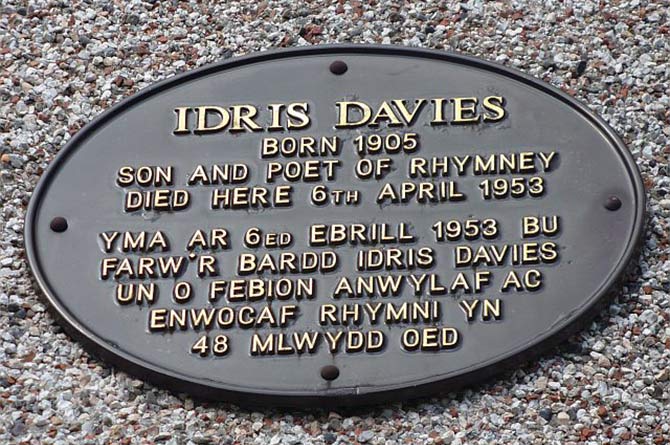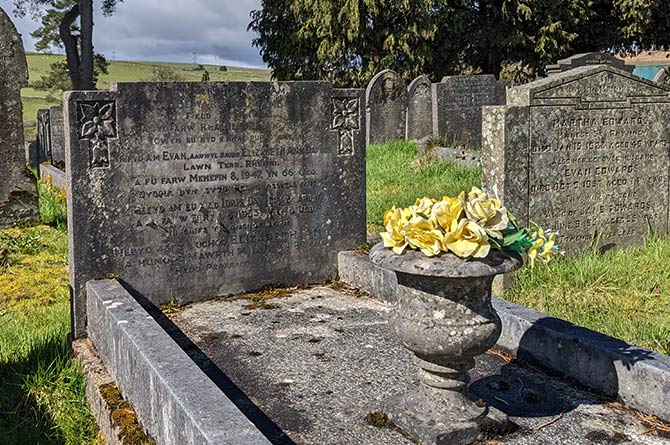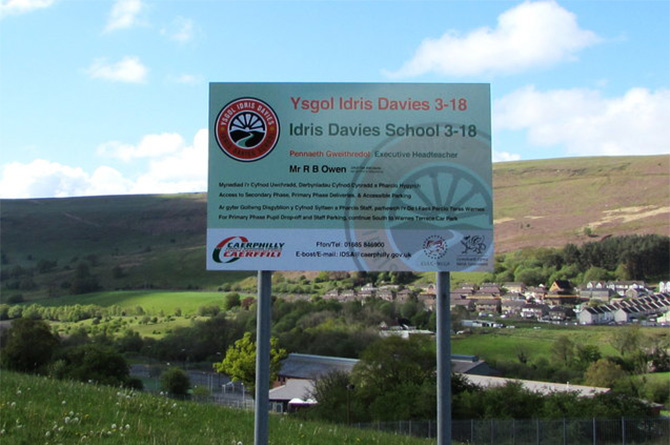Support quality, independent, local journalism…that matters
From just £1 a month you can help fund our work – and use our website without adverts. Become a member today

In Gwalia Deserta part XV, Idris Davies wrote:
“O what can you give me?
Say the sad bells of Rhymney.
And 70 years to the date that the poet died, the bells of his hometown of Rhymney chimed – this time in his memory.
This was thanks to Kevyn Price, leader of the Rhymney Heritage group, who arranged a special walk for Idris Davies around the town.
The walk took sites including his grave, his former homes and finished with the Rhymney bells of St David’s Church, ringing out.

Kevyn told Caerphilly Observer about his motivations and said: “I’ve been interested in Idris Davies since I was 15,” adding that this stemmed from proximity, his former next door neighbour used to live in Idris Davies’ house, as well as an emotional connection with his poems.
“It chimed with me,” said Kevyn, referring to XV from his collection of poems Gwalia Deserta, known by many as the song, the Bells of Rhymney, which has been covered by artists including Pete Seeger, the Byrds and the Alarm.
Davies’ poems took on various themes, from life between the two World Wars to industrial life in the Valleys.

And though he didn’t shy away from difficult topics, there was always a sense of pride in Wales and Rhymney.
This is a sentiment passionately shared by Kevyn. “Rhymney has been my life,” he said. “I’m so proud of Rhymney.”
Born in Rhymney in 1905, in what was then Monmouthshire, Idris Davies worked in the local colliery after leaving school.
He, like many, faced difficult working conditions and was affected by the 1926 General Strike – the period of unemployment which followed partly inspired Gwalia Deserta, which means ‘Deserted Wales’ in English – and went on to become a teacher instead after taking night classes.
He had several volumes of poetry published including his first Gwalia Deserta in 1938 to his last, Selected Poems, which was published shortly before he died of cancer in 1953.
He wrote from a socialist perspective in both Welsh and English.
His admirers include the well-known of the past, such as Dylan Thomas and T.S. Eliot, as well as the present, including the former MP for Islwyn, and former leader of the Labour Party, Lord Kinnock.

Lord Kinnock described his poetry and said: “He could be lyrical and trenchant, soothing and raging and vitally, his writing could always be understood – it was never obscure or mystical.”
Lord Kinnock, who has hosted a BBC Radio 4 programme about the late poet, told Caerphilly Observer about the importance of the poet.
“Idris was a remarkable man with deep Rhymney Valley roots, profound socialist values, a marvellous mocking sense of humour and great poetic talent.
“He has inspired me since I was very young because of the way in which he evoked the best instincts and achievements of my parents’ generation, brought to life the places that I knew, and, crucially, made the case for a better future.”
While Davies’ future world – our modern world of 2023 – would be unrecognisable to him in many ways, the growing hardship for working people and strikes for better conditions that have recently come to pass would have been well understood given he lived through bitter industrial times, including national miner’s strike of 1921 and the General Strike of 1926.
Dawn Bowden MS, member of the Senedd for Merthyr Tydfil and Rhymney, also remembered the poet and said: “I somehow feel that as his poetry was shaped by his own lived experience and that of the working people of his day he would have found much to drive his creative writing in the cost of living crisis facing many people at the moment.”

Ms Bowden, who is also deputy minister for arts and sport with the Welsh Government, added: “The poetry of Idris Davies has not only enriched our lives but ensures that the name of the community of Rhymney has spread around the world.
“His legacy is marked in a number of ways in the community including through the plaque on his home, the statue outside the library and the naming of a new school after him in 2018. As someone who became a teacher himself, this is a fitting legacy.
“His poetry tells of his times and the people of these communities.”
But, as his poetry encapsulates the importance of Rhymney’s past it can still help people look to the future.
Lord Kinnock said: “Idris Davies is a creative, radical son of Rhymney to be proud of. More important, he would say, he offered insights and convictions that need to be carried into tomorrow.”
Support quality, independent, local journalism…that matters
From just £1 a month you can help fund our work – and use our website without adverts.
Become a member today
